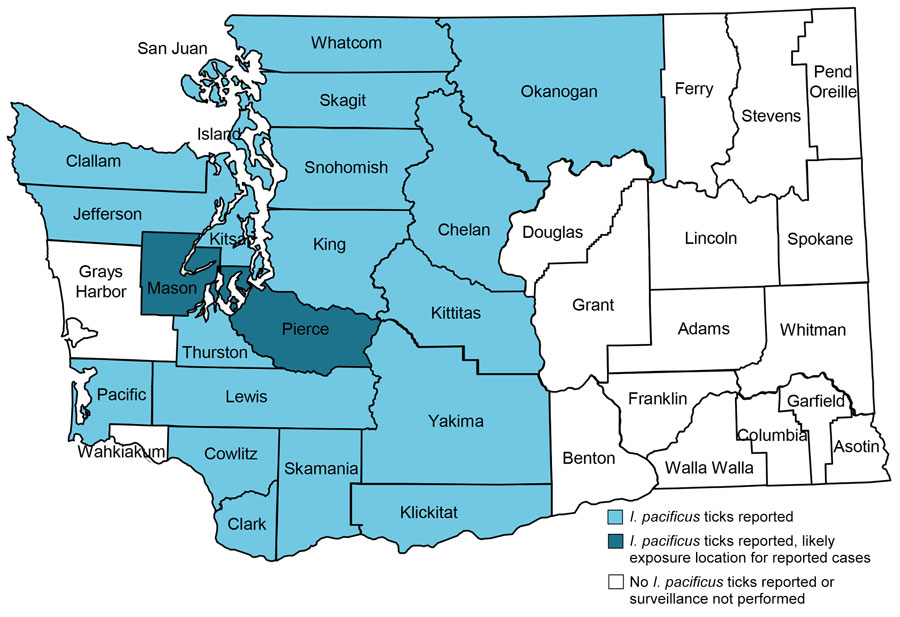Volume 31, Number 11—November 2025
Dispatch
Two Autochthonous Cases of Anaplasmosis, Washington, USA, 2022–2023
Figure

Figure. Geographic data from a study of 2 autochthonous cases of anaplasmosis, Washington, USA, 2022–2023. Blue indicates counties where health investigators have reported I. pacificus ticks (12); dark blue indicates counties of likely exposure for the 2 cases reported.
References
- Chen SM, Dumler JS, Bakken JS, Walker DH. Identification of a granulocytotropic Ehrlichia species as the etiologic agent of human disease. J Clin Microbiol. 1994;32:589–95. DOIPubMedGoogle Scholar
- Dykstra EA, Oltean HN, Kangiser D, Marsden-Haug N, Rich SM, Xu G, et al. Ecology and epidemiology of tickborne pathogens, Washington, USA, 2011–2016. Emerg Infect Dis. 2020;26:648–57. DOIPubMedGoogle Scholar
- Bakken JS, Krueth J, Wilson-Nordskog C, Tilden RL, Asanovich K, Dumler JS. Clinical and laboratory characteristics of human granulocytic ehrlichiosis. JAMA. 1996;275:199–205. DOIPubMedGoogle Scholar
- Biggs HM, Behravesh CB, Bradley KK, Dahlgren FS, Drexler NA, Dumler JS, et al. Diagnosis and management of tickborne rickettsial diseases: Rocky Mountain spotted fever and other spotted fever group rickettsioses, ehrlichioses, and anaplasmosis—United States. MMWR Recomm Rep. 2016;65:1–44. DOIPubMedGoogle Scholar
- Bakken JS, Krueth J, Wilson-Nordskog C, Tilden RL, Asanovich K, Dumler JS. Clinical and laboratory characteristics of human granulocytic ehrlichiosis. JAMA. 1996;275:199–205. DOIPubMedGoogle Scholar
- Bakken JS, Dumler S. Human granulocytic anaplasmosis.[ [viii. ]. Infect Dis Clin North Am. 2008;22:433–48, viii. DOIPubMedGoogle Scholar
- Dahlgren FS, Heitman KN, Drexler NA, Massung RF, Behravesh CB. Human granulocytic anaplasmosis in the United States from 2008 to 2012: a summary of national surveillance data. Am J Trop Med Hyg. 2015;93:66–72. DOIPubMedGoogle Scholar
- Schotthoefer AM, Meece JK, Ivacic LC, Bertz PD, Zhang K, Weiler T, et al. Comparison of a real-time PCR method with serology and blood smear analysis for diagnosis of human anaplasmosis: importance of infection time course for optimal test utilization. J Clin Microbiol. 2013;51:2147–53. DOIPubMedGoogle Scholar
- Centers for Disease Control and Prevention. Anaplasmosis—epidemiology and statistics [cited 2023 Oct 10]. https://www.cdc.gov/anaplasmosis/hcp/statistics/index.html
- Eisen RJ, Eisen L, Beard CB. County-scale distribution of Ixodes scapularis and Ixodes pacificus (Acari: Ixodidae) in the continental United States. J Med Entomol. 2016;53:349–86. DOIPubMedGoogle Scholar
- Poitout FM, Shinozaki JK, Stockwell PJ, Holland CJ, Shukla SK. Genetic variants of Anaplasma phagocytophilum infecting dogs in Western Washington State. J Clin Microbiol. 2005;43:796–801. DOIPubMedGoogle Scholar
- Centers for Disease Control and Prevention. CDC tick surveillance data sets. December 2023 [cited 2024 Jan 4]. https://www.cdc.gov/ticks/surveillance/TickSurveillanceData.html
- Washington State Department of Health. Washington tracking network—tick data dashboard. [cited 2023 Oct 10]. https://doh.wa.gov/data-and-statistical-reports/washington-tracking-network-wtn/tick-data/tick-dashboard
1These authors contributed equally to this article.
Page created: September 24, 2025
Page updated: December 10, 2025
Page reviewed: December 10, 2025
The conclusions, findings, and opinions expressed by authors contributing to this journal do not necessarily reflect the official position of the U.S. Department of Health and Human Services, the Public Health Service, the Centers for Disease Control and Prevention, or the authors' affiliated institutions. Use of trade names is for identification only and does not imply endorsement by any of the groups named above.